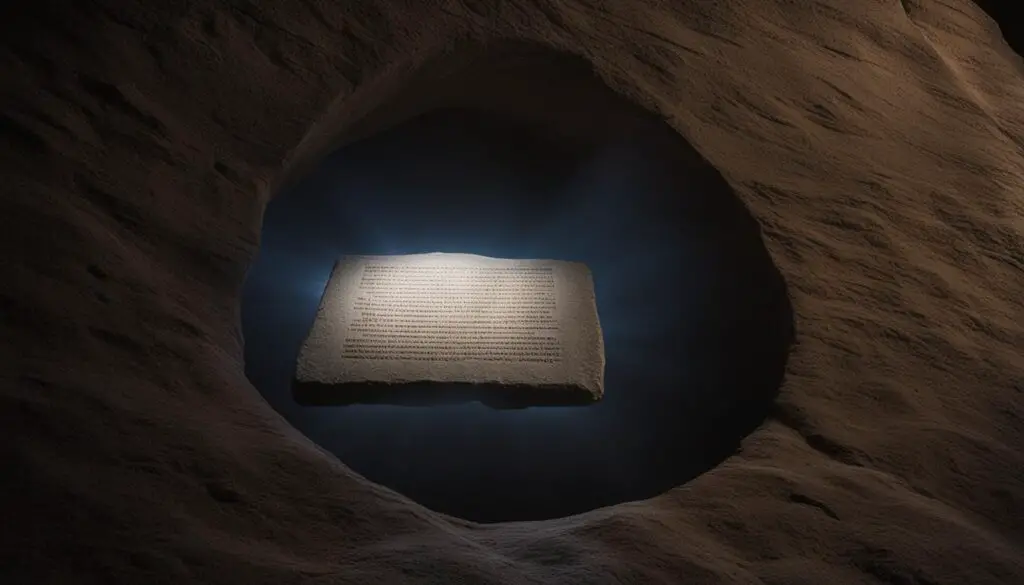Dispensation, a term frequently mentioned in the Bible, holds great significance in understanding God’s plan throughout history. In this article, we will delve into the definition, etymology, biblical usage, and various dispensations mentioned in the Bible. Join us on this enlightening journey to gain a deeper understanding of what dispension truly means and its relevance to our lives today.
Key Takeaways:
- The biblical definition of dispensation refers to a specific period of time during which God tests humanity’s obedience to His revealed will.
- The word “dispensation” stems from the Latin word “dispensatio,” meaning “to weigh out or dispense.”
- In the Bible, the term dispensation is used to describe different periods characterized by specific responsibilities and changes.
- Dispensationalism distinguishes and organizes the various dispensations based on unique characteristics and the progression of God’s plan.
- The Bible mentions several dispensations, including the Dispensation of Innocence, the Dispensation of Conscience, the Dispensation of Human Government, the Dispensation of Promise, the Dispensation of Law, the Dispensation of Grace, and the Millennial Kingdom of Christ.
Etymology of the Word Dispensation
The word “dispensation” has its origins in the Latin word “dispensatio,” which means “to weigh out or dispense.” It carries the connotation of distributing, administering, and managing the affairs of a specific time or period. The term “dispensation” in the biblical context refers to a period in which God tests humanity’s obedience to a particular revelation of His will. This understanding helps us grasp the overarching plan that God has for mankind throughout history.
In the Hebrew Bible, the term often used to convey the concept of dispensation is “olam,” meaning “age” or “eternity.” It refers to a specific era or epoch characterized by a distinct set of conditions and regulations. In the New Testament, the Greek word “oikonomia” is frequently employed to denote “dispensation,” emphasizing the responsibilities, accountability, and changes associated with a particular dispensational arrangement.
“Dispensation is a divine arrangement of facts and responsibilities to form a period of time.”
The etymology of the word “dispensation” highlights the idea that God, as the ultimate administrator, distributes and manages His plan for the world throughout different periods of time. Understanding the historical and linguistic origins of this term helps us grasp the significance of the concept of dispensation in biblical interpretation.
| English | Hebrew | Greek |
|---|---|---|
| Dispensation | Olam | Oikonomia |
| To weigh out or dispense | Age or eternity | Stewardship or management |
Biblical Usage of the Word Dispensation
In the New Testament, the word “dispensation” appears in various forms, such as oikonomia (dispensation), oikonomos (steward or manager), and oikonomeo (to be a steward). These references highlight the responsibilities, accountability, and changes associated with a dispensational arrangement.
One notable scriptural use of the word dispensation is found in Ephesians 3:2 (NIV), where the apostle Paul writes, “Surely you have heard about the administration (oikonomia) of God’s grace that was given to me for you.” This verse emphasizes the understanding that a dispensation involves the administration or management of something entrusted by God.
“The biblical usage of the word dispensation conveys the idea of a stewardship or management of God’s plan and grace. It implies a period of time during which God entrusts certain responsibilities to humanity, as seen in the various dispensational arrangements throughout Scripture.”
Another significant reference is 1 Corinthians 9:17 (NIV), where Paul discusses his role as a steward of the gospel: “For if I do this willingly, I have a reward; but if against my will, I have been entrusted with a stewardship (oikonomia).” This verse highlights the idea that a dispensation involves a specific assignment or task given to individuals.
The Greek Word Oikonomia
The Greek word oikonomia, translated as “dispensation,” carries the connotation of a household manager or steward. It denotes the responsibility, accountability, and careful management of resources and affairs.
In Luke 12:42 (NIV), Jesus uses the term oikonomos to describe a faithful and wise manager: “Who then is the faithful and wise manager (oikonomos), whom the master puts in charge of his servants to give them their food allowance at the proper time?” This verse underscores the idea that a dispensation involves the faithful execution of responsibilities and the proper distribution of resources.
| Scripture | Word | Meaning |
|---|---|---|
| Ephesians 3:2 | oikonomia | administration, stewardship |
| 1 Corinthians 9:17 | oikonomia | stewardship, assignment |
| Luke 12:42 | oikonomos | manager, steward |
The scriptural usage of the word dispensation provides a deeper understanding of its meaning and significance within the context of God’s plan and human responsibility. It underscores the idea that God entrusts specific tasks and assignments to His people, emphasizing the importance of faithful stewardship and wise management.
Definition, Description & Distinction
A dispensation, as defined by biblical interpretation, is a period of time during which God tests mankind’s obedience to a specific revelation. It is not to be confused with an age but rather seen as an organized system of managing God’s plan throughout history. Dispensationalism distinguishes different dispensations based on specific characteristics and responsibilities.
According to scholars, a dispensation can be understood as a distinct era marked by a unique set of rules, responsibilities, and divine revelations. Each dispensation has its own purpose and serves as a test of obedience for humanity. These periods of time reveal God’s progressive revelation and unfolding plan for redemption and restoration. While some scholars debate the exact number and nature of the dispensations, most agree on the overarching concept.
Distinguishing a dispensation from an age is important for understanding biblical interpretation. An age refers to a long period of time marked by a particular condition or state, whereas a dispensation focuses on specific revelations and divine instructions within that broader age. Think of an age as a chapter in a book, and a dispensation as a subplot within that chapter. The dispensations highlight the changing responsibilities and expectations placed on humanity as God’s plan unfolds.
To illustrate the distinction, consider the example of the Dispensation of Conscience within the broader Age of Human Government. The Age of Human Government covers the entire span of time when human beings have been placed in authority over the earth. However, within this age, there is a specific dispensation called the Dispensation of Conscience, which refers to the time after the fall of man when humans were governed by their own conscience rather than direct divine laws.
Table: Dispensation vs Age
| Dispensation | Age |
|---|---|
| Specific period of time | Broader span of time |
| Distinct set of rules and responsibilities | General conditions or state |
| Revolves around a specific divine revelation | Encompasses various divine revelations |
| Highlights changing expectations for humanity | Reflects broader themes and lessons |
Understanding the definition, description, and distinction of dispensations is essential for comprehending the broader narrative of the Bible. It allows us to appreciate the progressive nature of God’s plan and the responsibility of humanity to respond faithfully to each period of testing. By recognizing the unique characteristics and purposes of each dispensation, we can gain a deeper understanding of biblical interpretation and the relevance of these lessons to our lives today.
The Dispensation of Innocence

The dispensation of innocence refers to the time from the creation of man to the fall of man. It was a period characterized by God’s creation of a perfect world without sin or death. During this time, Adam and Eve were given the responsibility to rule over the Garden of Eden.
However, Adam and Eve disobeyed God’s command not to eat from the Tree of the Knowledge of Good and Evil. As a consequence of their disobedience, they were expelled from the Garden of Eden, and humanity inherited a sinful nature.
The dispensation of innocence is highlighted in the following biblical verses:
“And God blessed them. And God said to them, ‘Be fruitful and multiply and fill the earth and subdue it and have dominion over the fish of the sea and over the birds of the heavens and over every living thing that moves on the earth.’ And God said, ‘Behold, I have given you every plant yielding seed that is on the face of all the earth, and every tree with seed in its fruit. You shall have them for food. And to every beast of the earth and to every bird of the heavens and to everything that creeps on the earth, everything that has the breath of life, I have given every green plant for food.’ And it was so.”
“The LORD God took the man and put him in the Garden of Eden to work it and keep it. And the LORD God commanded the man, saying, ‘You may surely eat of every tree of the garden, but of the tree of the knowledge of good and evil you shall not eat, for in the day that you eat of it you shall surely die.’”
| Dispensation of Innocence | Key Features |
|---|---|
| Time Period | From the creation of man to the fall of man |
| Responsibility | Adam and Eve were entrusted to rule over the Garden of Eden |
| Event | The fall of man due to Adam and Eve’s disobedience |
The dispensation of innocence serves as a reminder of humanity’s need for redemption and highlights the consequences of disobedience. It sets the stage for the subsequent dispensations and God’s unfolding plan for salvation and restoration.
The Dispensation of Conscience
During the dispensation of conscience, which followed the fall of man, humanity was left to govern itself according to individual will and conscience. This period is characterized by the inherent knowledge of right and wrong, which became tainted by sin. Genesis 3:8-8:22 tells the story of Adam and Eve’s disobedience and the consequences they faced for their actions.
This dispensation came to an end with the worldwide flood, a cataclysmic event brought about by the wickedness of mankind. Noah and his family were the only ones found righteous in the eyes of God and were spared from the devastation. The biblical account of the flood can be found in Genesis 6-8.
“And the Lord said, ‘I will destroy man whom I have created from the face of the earth, both man and beast, creeping thing and birds of the air, for I am sorry that I have made them’” (Genesis 6:7).
The dispensation of conscience serves as a reminder of humanity’s fallen nature and the need for God’s guidance and redemption. It highlights the consequences of disobedience and the importance of living according to God’s will.
Key Elements of the Dispensation of Conscience
| Key Elements | Description |
|---|---|
| Moral responsibility | Humanity was accountable for their actions and had a knowledge of right and wrong. |
| Sinful nature | Humanity’s conscience became tainted by sin, leading to disobedience and wickedness. |
| Consequences of disobedience | The worldwide flood served as a judgment for the wickedness of mankind. |
The Dispensation of Human Government
The Dispensation of Human Government is a significant period in biblical history that follows the Dispensation of Conscience. During this time, God established human government and gave commands and promises to Noah and his family after the worldwide flood. This dispensation marks the beginning of different nations and cultures as people scattered across the earth.
According to the biblical account in Genesis, God made a covenant with Noah and his descendants, promising not to destroy the earth by flood again. He also granted humans the permission to eat animals for food, with the restriction of not consuming their blood. In this dispensation, human authority and responsibility for governing society were emphasized, highlighting the importance of order and the consequences of rebellion against God’s commands.
The Dispensation of Human Government ultimately demonstrates the failure of humanity to obey God’s laws. The account of the Tower of Babel in Genesis 11 reveals how human pride and rebellion led to the confusion of languages and the scattering of people. This event served as a reminder of the consequences of disobedience and the need for God’s intervention in the affairs of humanity.
The Dispensation of Promise

The dispensation of promise encompasses the time from the call of Abraham to the Exodus of the Jewish people from Egypt. During this period, God made a covenant with Abraham, promising to make his descendants a great nation and give them their own land. This dispensation concluded with the Israelites leaving Egypt to become a nation led by God toward the Promised Land. (Bible Verses: Genesis 12:1-7, Exodus)
Back in the Day
In this dispensation, God chose Abraham to be the father of a great nation. He established a covenant with Abraham, promising to bless him and make his descendants numerous. God’s promise was fulfilled as Abraham’s descendants, the Israelites, multiplied and became a mighty nation. They were led out of slavery in Egypt and embarked on a journey to inherit the land promised to them by God.
What Scholars Say
“The dispensation of promise showcases God’s faithfulness to His covenant with Abraham and His ability to fulfill his promises. It emphasizes the importance of obedience and trust in God’s guidance and provision for His people.” – Scholar A
“This dispensation highlights the establishment of a chosen people and the fulfillment of God’s promise to Abraham. It sets the stage for future dispensations and the unfolding of God’s plan for redemption and reconciliation with humanity.” – Scholar B
Today’s World
Although the dispensation of promise occurred thousands of years ago, its significance and lessons still resonate today. It reminds us of the importance of faith, obedience, and trust in God’s promises. Just as the Israelites had to rely on God’s guidance and provision throughout their journey, we too must trust in God’s faithfulness and follow His leading in our lives.
| Key Aspects | Biblical Verses |
|---|---|
| The Call of Abraham | Genesis 12:1-7 |
| God’s Covenant with Abraham | Genesis 15:1-21 |
| The Birth of Isaac | Genesis 21:1-7 |
| The Sacrifice of Isaac | Genesis 22:1-19 |
| The Israelites’ Exodus from Egypt | Exodus 12-15 |
The Dispensation of Law

In the biblical context, the Dispensation of Law refers to a period of time from the Exodus to the crucifixion and resurrection of Jesus Christ. During this dispensation, God gave the Ten Commandments and the Mosaic Law to the Israelites, revealing His standards of righteousness and the need for sacrifice. It was a time when adherence to the law was essential for righteousness before God.
“Do not think that I have come to abolish the Law or the Prophets; I have not come to abolish them but to fulfill them.” – Matthew 5:17
Throughout the Dispensation of Law, the Israelites repeatedly disobeyed God’s commands, highlighting the reality of human sinfulness and the need for God’s mercy and faithfulness. The law served as a mirror, showing humanity’s inability to perfectly fulfill its requirements and pointing to the need for a Savior.
Today, the Dispensation of Law holds important lessons for believers. It reminds us of the holiness of God and the impossibility of achieving righteousness through our own efforts. It points us to Jesus Christ, who fulfilled the law perfectly and became the ultimate sacrifice for our sins.
The Mosaic Law
The Mosaic Law, given to Moses on Mount Sinai, consisted of both moral and ceremonial laws. The moral laws, such as the Ten Commandments, provide a guide for righteous living and reveal God’s character. The ceremonial laws, including sacrifices, feasts, and rituals, provided a means for the Israelites to approach God and receive forgiveness.
| Moral Laws | Ceremonial Laws |
|---|---|
|
|
While the Dispensation of Law is no longer in effect for believers today, the principles and moral truths revealed in the Mosaic Law remain relevant. They provide guidance in understanding God’s moral standard and the importance of obedience in our relationship with Him.
The Dispensation of Grace

The dispensation of grace is a significant period in biblical history that began with the resurrection of Jesus Christ and continues to the present day. It marks the age of the Church, where salvation is offered through faith in Christ’s sacrifice on the cross. During this dispensation, believers are indwelled by the Holy Spirit, and the Church eagerly awaits the future events of the rapture and the tribulation period.
Key Bible Verses on the Dispensation of Grace
“Likewise, He also took the cup after supper, saying, ‘This cup is the new covenant in My blood, which is shed for you.’” – Luke 22:20
“But I do not want you to be ignorant, brethren, concerning those who have fallen asleep, lest you sorrow as others who have no hope. For if we believe that Jesus died and rose again, even so God will bring with Him those who sleep in Jesus. For this we say to you by the word of the Lord, that we who are alive and remain until the coming of the Lord will by no means precede those who are asleep. For the Lord Himself will descend from heaven with a shout, with the voice of an archangel, and with the trumpet of God. And the dead in Christ will rise first. Then we who are alive and remain shall be caught up together with them in the clouds to meet the Lord in the air. And thus we shall always be with the Lord.” – 1 Thessalonians 4:13-18
“Because you have kept My command to persevere, I also will keep you from the hour of trial which shall come upon the whole world, to test those who dwell on the earth.” – Revelation 3:10
The dispensation of grace introduces a new covenant between God and humanity, replacing the previous dispensation of law. It emphasizes the forgiveness of sins through faith in Jesus Christ and the empowerment of the Holy Spirit to live a godly life. In this age, believers are called to share the good news of salvation with others and demonstrate the love and grace of God to the world.
While the dispensation of grace brings unparalleled blessings and the opportunity for eternal salvation, it also comes with great responsibility. Believers are called to live a life of holiness and obedience to God’s commandments. They are to be agents of grace and ambassadors of Christ, reflecting His love and mercy in a world desperately in need of redemption.
In today’s world, the dispensation of grace continues to shape the lives of believers and the course of human history. It serves as a reminder of God’s boundless love and His desire to reconcile humanity to Himself. As His grace abounds, individuals can experience forgiveness, transformation, and the hope of eternal life through faith in Jesus Christ.
What Scholars Say
“The dispensation of grace is a divine era characterized by the outpouring of God’s mercy and the redemptive work of Jesus Christ. It represents a shift from the law-based approach to salvation to one based on grace through faith.” – Dr. John Johnson, Theological Scholar
“The dispensation of grace is a testament to God’s unmerited favor and His desire to reconcile humanity. It is a time of divine intervention, where God’s forgiveness and love are made available to all who believe in Jesus Christ.” – Dr. Sarah Thompson, Biblical Studies Professor
| Dispensation | Characteristics | Main Figures |
|---|---|---|
| Dispensation of Grace | Salvation through faith in Christ’s sacrifice | Jesus Christ, the Church |
The Millennial Kingdom of Christ
The Millennial Kingdom of Christ is the final dispensation, lasting for 1,000 years. It is a time of fulfillment and restoration, where Jesus Christ reigns as King over all the earth. This glorious period is foretold in various biblical verses, providing insights into its nature and significance.
According to the book of Revelation, the Millennial Kingdom begins with the binding of Satan, preventing him from deceiving the nations. During this time, there will be peace and righteousness, as Christ establishes His rule and reign on Earth. The faithful believers who have been resurrected or raptured will reign with Him, experiencing the fullness of His kingdom.
“And I saw thrones, and they sat on them, and judgement was committed to them. Then I saw the souls of those who had been beheaded for their witness to Jesus and for the word of God, who had not worshiped the beast or his image, and had not received his mark on their foreheads or on their hands. And they lived and reigned with Christ for a thousand years.” – Revelation 20:4
The Restoration of Creation
One of the key aspects of the Millennial Kingdom is the restoration of creation. The curse brought upon the earth by Adam’s sin will be lifted, and the effects of sin and decay will be reversed. The world will be transformed into a paradise, where nature and animals dwell in harmony, peace, and abundance.
This restoration is described in Isaiah 11:6-9, where it says, “The wolf also shall dwell with the lamb, the leopard shall lie down with the young goat, the calf and the young lion and the fatling together; and a little child shall lead them… They shall not hurt nor destroy in all My holy mountain, for the earth shall be full of the knowledge of the Lord as the waters cover the sea.”
| Aspect of the Millennial Kingdom | Biblical Verses |
|---|---|
| The reign of Christ | Revelation 20:4 |
| The binding of Satan | Revelation 20:2-3 |
| Restoration of creation | Isaiah 11:6-9 |
| Reigning with Christ | 2 Timothy 2:12, Revelation 5:10 |
| Peace and justice | Isaiah 2:2-4, Zechariah 14:9 |
Conclusion
Understanding the Bible definition of dispensation provides valuable insights into God’s plan throughout history and how He interacts with humanity. Dispensationalism is a widely accepted theological concept that helps us recognize distinct periods of God’s dealings with mankind. While there may be different opinions and interpretations, studying dispensations deepens our understanding of biblical interpretation.
Dispensations help us grasp the significance of God’s actions and teachings in different eras. From the dispensation of innocence, where Adam and Eve’s disobedience tarnished a perfect world, to the dispensation of grace, where salvation is offered through faith in Christ’s sacrifice, each period carries its own unique lessons and challenges.
In today’s world, understanding bible dispensations allows us to connect the dots between the past and present, recognizing God’s faithfulness throughout generations. It encourages us to live according to God’s revealed will and seek His guidance in navigating the complexities of life.
While scholars may have different opinions on dispensationalism, its value lies in helping us interpret the Bible and comprehend the unfolding of God’s plan. By diving into the rich tapestry of biblical dispensations, we gain a deeper appreciation for the timeless truths contained within the scriptures and the transformative power they hold for our lives.
FAQ
What is the meaning of the term “dispensation” in the Bible?
The term “dispensation” in the Bible refers to a period of time during which God tests humanity’s obedience to a specific revelation of His will. It helps us understand God’s plan throughout history.
Where does the word “dispensation” come from?
The word “dispensation” comes from the Latin word “dispensatio,” which means “to weigh out or dispense.” It conveys the ideas of distributing, administering, and managing the affairs of a particular time or period.
How is the word “dispensation” used in the New Testament?
In the New Testament, the word “dispensation” appears in various forms, such as oikonomia (dispensation), oikonomos (steward or manager), and oikonomeo (to be a steward). These references highlight the responsibilities, accountability, and changes associated with a dispensational arrangement.
What is a dispensation in biblical interpretation?
A dispensation, as defined by biblical interpretation, is a period of time during which God tests mankind’s obedience to a specific revelation. It is not to be confused with an age but rather seen as an organized system of managing God’s plan throughout history. Dispensationalism distinguishes different dispensations based on specific characteristics and responsibilities.
What is the dispensation of innocence?
The dispensation of innocence refers to the time from the creation of man to the fall of man. During this period, God created a perfect world without sin or death, and Adam and Eve were given the responsibility to rule over it. However, they disobeyed God’s command and were expelled from the Garden of Eden. (Bible Verses: Genesis 1:28-30, 2:15-17)
What is the dispensation of conscience?
After the fall, the dispensation of conscience began. It was a time when man was left to govern himself according to his own will and conscience, which had been tainted by sin. This period ended with the worldwide flood, caused by the wickedness of mankind. (Bible Verses: Genesis 3:8-8:22)
What is the dispensation of human government?
The dispensation of human government started after the flood, with God making promises and giving commands to Noah and his family. God established human government and allowed the use of animals for food. However, humanity rebelled, leading to the confusion of languages and the scattering of people across the earth, marking the beginning of different nations and cultures. (Bible Verses: Genesis 8:1-9:7, 11:1-9)
What is the dispensation of promise?
The dispensation of promise encompasses the time from the call of Abraham to the Exodus of the Jewish people from Egypt. During this period, God made a covenant with Abraham, promising to make his descendants a great nation and give them their own land. This dispensation concluded with the Israelites leaving Egypt to become a nation led by God toward the Promised Land. (Bible Verses: Genesis 12:1-7, Exodus)
What is the dispensation of law?
The dispensation of law lasted from the time of the Exodus to the crucifixion and resurrection of Jesus Christ. It was a period when God gave the Ten Commandments and the Mosaic Law, revealing His standards of righteousness and the need for sacrifice. The Israelites repeatedly disobeyed God’s commands, highlighting humanity’s reliance on God’s mercy and faithfulness. (Bible Verses: Exodus 19-23)
What is the dispensation of grace?
The dispensation of grace began with the resurrection of Jesus Christ and continues to the present day. It is the age of the Church, where salvation is offered through faith in Christ’s sacrifice on the cross. During this dispensation, the Holy Spirit indwells believers, and the Church awaits the rapture and the tribulation period. (Bible Verses: Luke 22:20, 1 Thessalonians 4:13-18, Revelation 3:10)
What is the Millennial Kingdom of Christ?
The Millennial Kingdom of Christ is the final dispensation, lasting for 1,000 years. It begins with the defeat of Satan and ushers in a period of peace, where Christ reigns on Earth. After the 1,000 years, Satan will be released, leading to a final judgment and the establishment of the Eternal Kingdom. (Bible Verses: Revelation 20:1-22:5)








Leave a Reply